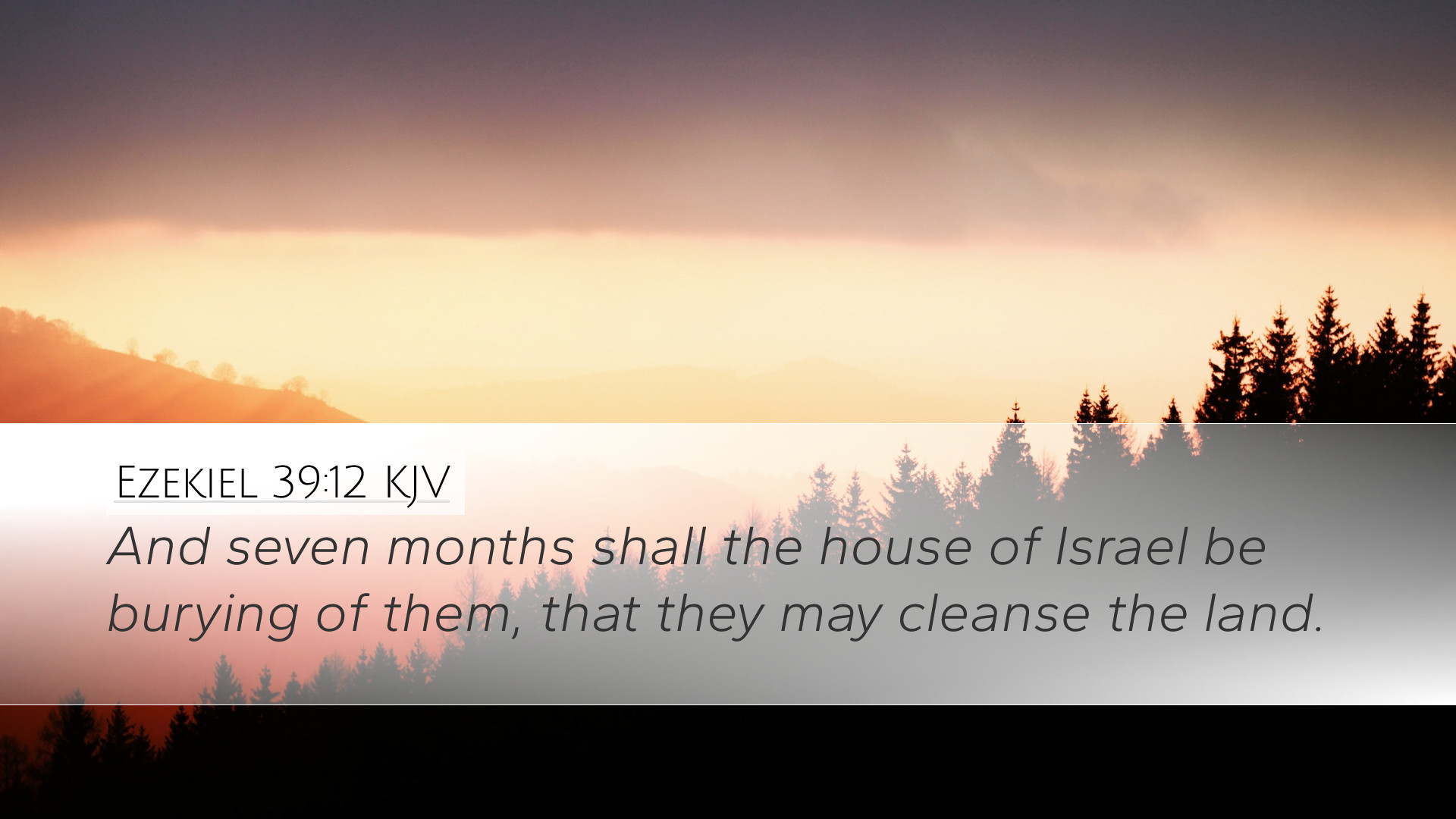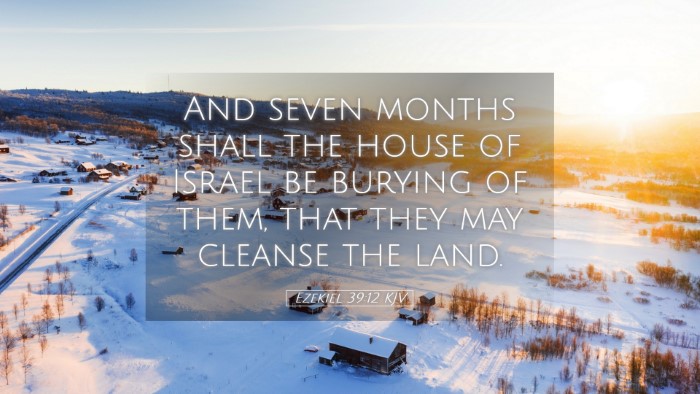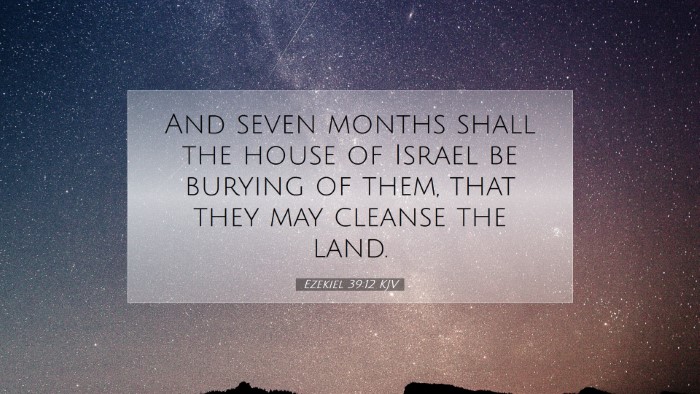Ezekiel 39:12 - Biblical Commentary
Verse Reference: "And seven months shall the house of Israel be burying of them, that they may cleanse the land." (Ezekiel 39:12)
Introduction
The prophecy of Ezekiel encompasses a rich tapestry of themes, symbolisms, and teachings that resonate through time. This specific verse, Ezekiel 39:12, is part of a broader context that speaks to the aftermath of judgment upon the nations and the restoration of Israel. To provide insight into this verse, we draw from prominent public domain commentaries, notably by Matthew Henry, Albert Barnes, and Adam Clarke, reflecting their interpretations and theological conclusions.
Context of the Passage
Ezekiel 39 is pivotal in the prophecy regarding Gog and Magog, illustrating God’s judgment and the subsequent purification of Israel. The surrounding chapters provide a vivid account of divine retribution against the enemies of Israel and the promise of restoration that follows. This specific verse signifies the extensive process required to cleanse the land after the destruction caused by God's enemies, encapsulating a significant act of national restoration.
Commentary Insights
Matthew Henry’s Commentary
Matthew Henry emphasizes the solemnity of the cleansing process described in this verse. He notes that the act of burying the dead, which is to last for seven months, symbolizes more than mere physical burial; it indicates the extensive nature of God’s judgment and the seriousness of sin. The lengthy period underscores the thoroughness with which God addresses sin and impurity in His land. Henry also draws attention to the number seven, symbolizing completeness in the Biblical narrative, suggesting that the cleansing process itself is divinely orchestrated to ensure full restoration.
Albert Barnes’ Notes on the Bible
Albert Barnes provides a detailed analysis of the implications of this burial period. He points out that the seven-month duration serves as a significant time frame indicating the severity of the situation. The house of Israel's action in burying the dead signifies an act of responsibility and communal purification. Furthermore, Barnes sheds light on the physical and symbolic act of cleansing, aligning it with the hope of eventual restoration for Israel. He concludes that this act of burial is fundamental in preparing the land for the return of God’s favor and presence.
Adam Clarke’s Commentary
Adam Clarke offers a theological reflection on the notion of cleansing the land. He interprets the act of burying as not merely a ritualistic or cultural requirement but as a profound representation of moral and spiritual cleansing. Clarke elaborates on the importance of Israel's role in this process, as it not only relates to physical cleanliness but also symbolizes the restoration of spiritual vitality post-judgment. He highlights that the meticulous burying could serve to demonstrate God's justice, with the Israelites actively engaging in a process that restores sanctity to the land they inhabit.
Theological Reflections
This verse offers rich theological reflections concerning judgment, restoration, and communal responsibility. In light of the interpretations of the aforementioned commentators, we can draw key insights:
- Judgment and Cleansing: The act of burying signifies the importance of addressing sin and its consequences. It reminds us that God's judgment is not arbitrary; it is meticulous and aimed at restoring holiness to His people.
- The Number Seven: The use of the number seven suggests completeness and divine purpose. The process of cleansing is not rushed but fulfilled completely according to God's timing and wisdom.
- Community Involvement: The collective action taken by Israel underscores the importance of community in the process of restoration. This collective responsibility is critical as the people of God navigate the aftermath of judgment.
- Hope and Renewal: The burial of the dead not only symbolizes grief and loss but also points to the hope of renewal and the return of God’s presence among His people as they strive for purity.
Practical Applications
For pastors, theologians, and students of Scripture, this exposition on Ezekiel 39:12 invites numerous practical applications:
- Reflection on Sin: It challenges communities to consider how sins must be confronted and addressed to foster deep, meaningful repentance and restoration in the eyes of God.
- Understanding Judgment: The realities of judgment serve as a sobering reminder of God's holiness and His intolerance of sin, motivating believers to pursue lives that glorify Him.
- Community Responsibility: The active role of the Israelites suggests that church communities must work together to support each other's spiritual journeys, especially during times of challenge.
- Hope in Restoration: This passage reassures believers of the continuity of God’s grace and the hope that resides in genuine restoration following periods of spiritual decline.
Conclusion
Ezekiel 39:12 stands as a powerful verse encapsulating the complex themes of judgment, repentance, and restoration within the narrative of God's people. The insights drawn from the commentaries of Henry, Barnes, and Clarke provide a rich foundation for understanding how this verse speaks not only historically but also contemporarily. As spiritual leaders and scholars reflect upon this text, may they be inspired to lead communities toward a deeper understanding of God’s justice and the transformative power of His grace.


